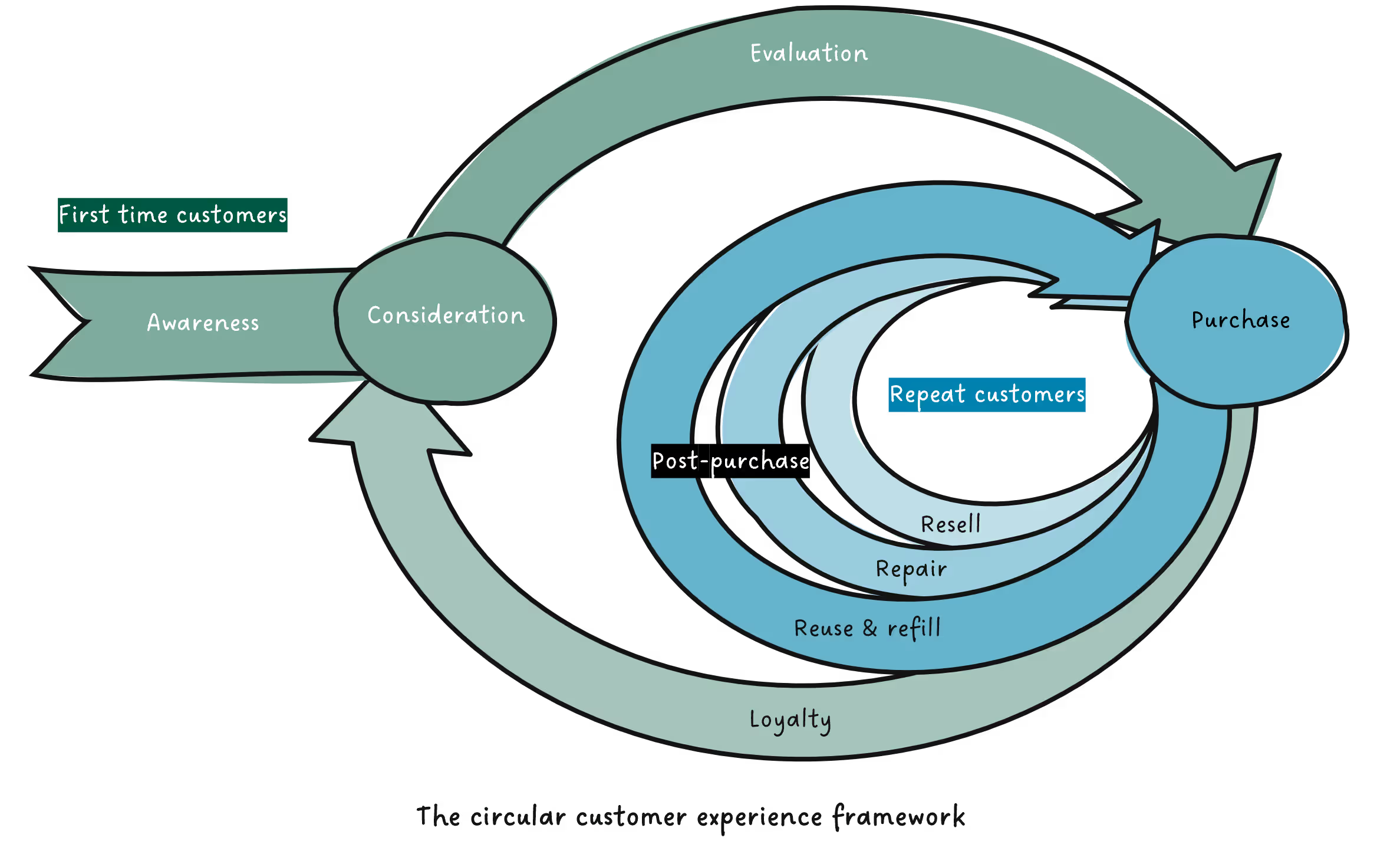Circular CX Framework for Sustainble Retail


Many sustainable initiatives fail to deliver their intended impact because they lack consumer engagement, brand alignment or both.
It doesn’t matter how impactful ideas are. If customers can’t understand or easily use them, they will struggle to scale to the point that justifies the investment.
But when you get the experience right, sustainable initiatives are not just good for the planet, they are good for business too.
Initiatives like takeback, resale or repair can all help businesses to deliver on sustainability goals and drive revenue.
Yet for retails brands, these schemes live and die with customer engagement. If your customers can't find them or aren't motivated to use them, then they will always struggle to realise their full impact.
When sustainability features are disconnected from the main customer journey, engagement suffers, and so does revenue.
After reviewing nearly 1000 ecommerce websites, we have identified common issues such as:
Research shows circular initiatives can deliver tangible ROI when designed with customer experience at the center:
90% of customers who received credit for using takeback went on to purchase, making it an effective acquisition channel.
By introducing branded resale marketplaces, brands generated up to 10% incremental revenue, even when the marketplace itself is peer to peer only and generates no direct income.
By introducing circularity messaging into the pre-purchase customer journey, a major sportswear brand increased ATV by up to 10% over subsequent visits, regardless of whether customers participated or not
The big Circular Economy frameworks from organisaitions like Ellen MacArthur Foundation and WBCSD exist to help businesses to reduce their environmental impact in a structured and measurable way.
Yet for retail brands seeking to implement more sustainable and circular activity across their value chain, there are two common challenges with many of these frameworks:
Circular retail solutions have been shown to deliver substantial incremental revenue for brands that embrace them. Yet they are often positioned as ESG costs or efficiency drivers, with little commercial upside beyond material recovery or risk avoidance. Positioning them in this way can make gaining buy-in from marketing and ecommerce teams more challenging.
Circular initiatives need customer enegagement to be successful, yet the role of the consumer is often downplayed in circular economy frameworks. When present, practical guidance tends to focus on marketing and communications tactics.
The mechanics of driving lasting behaviour change - customer experience design - are often explicitly excluded from the frameworks.
We created this framework after extensive research into the challenges facing sustainable retail online. We spent 2 years understanding what was behind leading brands' success and the challenges holding others back.
Our Circular CX Framework takes a customer-centric approach to circularity, in order to bridge the revenue gap between operational success and customer engagement.
By applying circular economy principles to customer experience design across the digital shopper journey, we can help drive repeat revenue and keep value in the loop.

Integrate sustainable messaging into off-platform comms in a way that is aligned with brand positioning.
Consistent and transparent messaging around credentials and commitments that is easy to find without being "in your face"
Use UX features and product information to support sustainable choices
Highlight the value exchange of circular services at checkout
Use timely communications around care, maintenance, and end-of-life
Create rewarding circular services, linked to loyalty, that keep customers in your brand ecosystem
We've developed our framework from a deep dive review of leading sustainable brands across the retail industry. Through research, conversations and audits, we have identified the patterns, friction points, and best practices in customer experience design that drive circular successess.
We have also conducted a large-scale assessment, testing the framework's principles across almost 1,000 fashion retail sites to validate our findings and benchmark circular CX maturity.
Key findings included:
Circular CX Maturity of UK Apparel Brands
(Nov 2025)

● Small retailers ● Large retailers
We have defined a 5 stage Circular CX maturity model, to help retail businesses understand their progress and define strategic direction.
Most brands are still at Level 1 and 2. Moving beyond this requires intentional CX design, not just more sustainability investment.
Want to dive deeper into the framework, see detailed examples, and access our complete measurement approach?
Download the Circular CX Playbook - 26 pages covering:
Enter your details below to receive the full playbook.